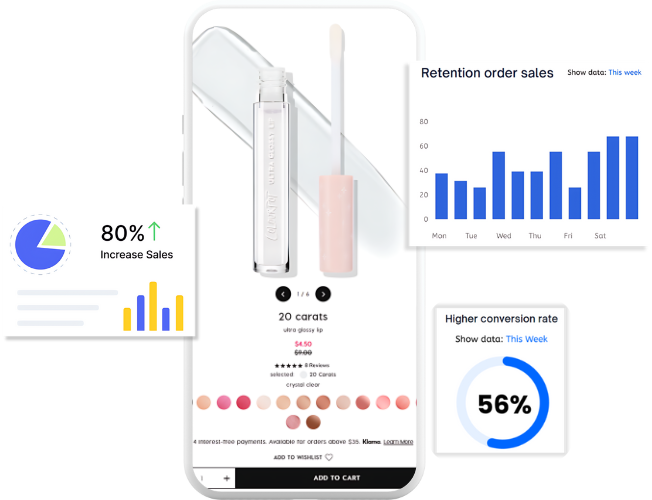
E-commerce has become a popular industry in the 21st century with the rapid development of the Internet. Two giants stand in this digital landscape: Wix and Shopify.
Many online business owners hesitate between the two platforms. Both Shopify and Wix are popular platforms for creating e-commerce websites. They cater to the needs of ecommerce store owners by providing features and tools that facilitate store management, customization, and expansion strategies. Today, we look at the differences between Wix and Shopify and, hopefully, help you make your final decision.
Wix Overview
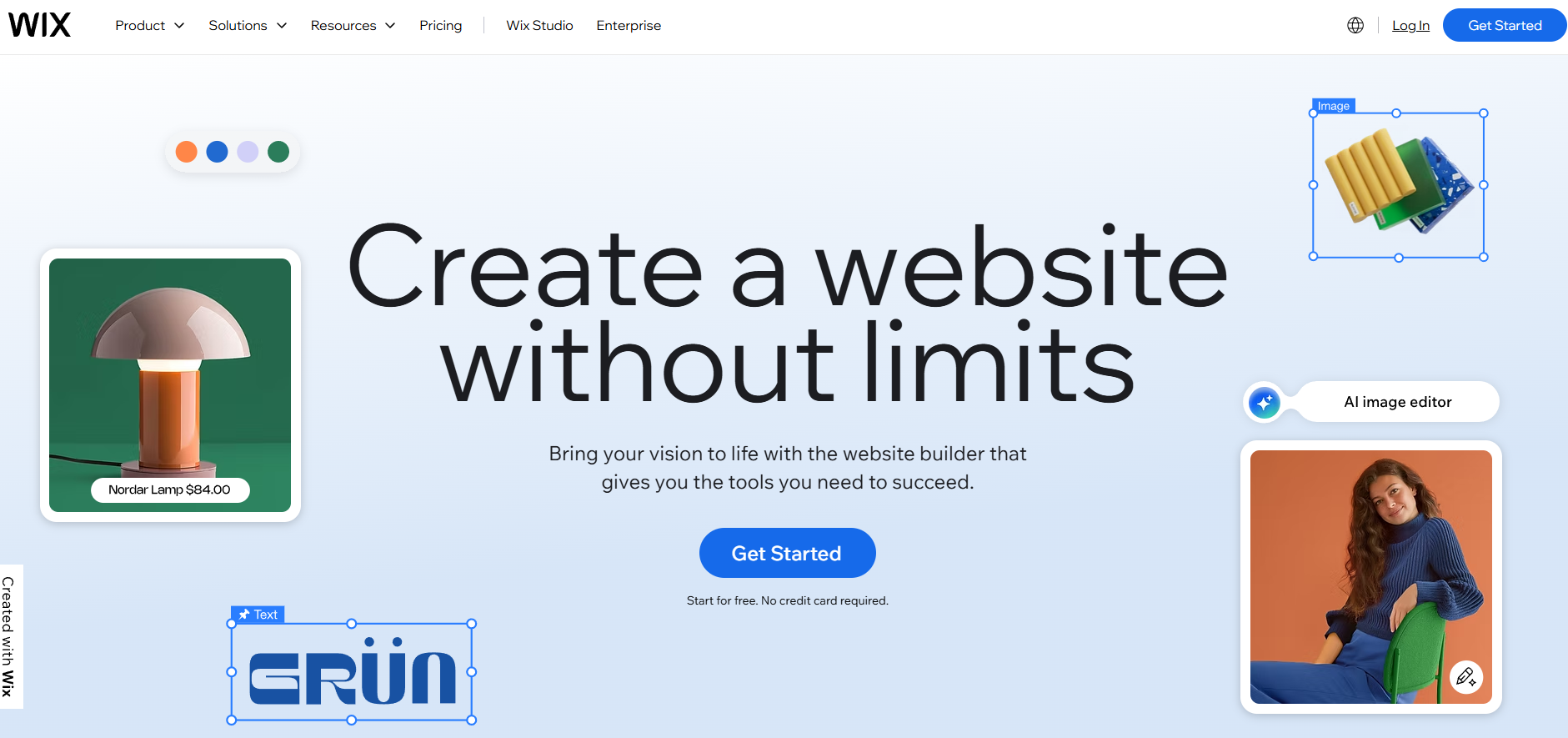
Wix is a comprehensive website-building platform designed for creating various websites, including personal blogs, business websites, portfolios, and more. As e-commerce continues to grow, Wix has expanded its offerings to include robust online store capabilities through its e-commerce solution.
Wix offers a free custom domain for the first year with its annual plans, making it an appealing option for users looking to establish a professional online presence with minimal initial cost.
For merchants looking to establish their online presence, Wix’s e-commerce features provide a complete set of tools essential for running an online store. The platform integrates fundamental e-commerce functionalities such as product management, inventory tracking, order processing, and payment integration. Through its intuitive drag-and-drop interface, merchants can launch their online stores quickly and begin selling products without requiring technical expertise.
Pros of Wix
User-Friendly Interface. Its user-friendly approach allows you to launch your online stores without any technical expertise.
Design Flexibility. It offers extensive customization options through an intuitive drag-and-drop interface, enabling businesses to create visually appealing storefronts aligning with brand identity.
All-in-One Solution. The integrated hosting, security, and basic marketing tools eliminate the need for multiple service providers and reduce initial setup complexity.
Cost-Effective Entry. Lower initial investment compared to enterprise solutions. No additional hosting costs
Cons of Wix
E-commerce Constraints. While Wix offers basic e-commerce functionality, it falls short in advanced features that growing businesses might need. The platform’s e-commerce capabilities, though adequate for small stores, may become restrictive as businesses scale.
Platform Lock-in. It’s difficult to migrate to other platforms even if changing templates requires substantial effort.
Performance Considerations. Its SEO performance may not match that of dedicated e-commerce platforms. Page load speeds can be affected by design elements.
Technical Boundaries. Restricted API access and limited custom coding options.
Shopify Overview
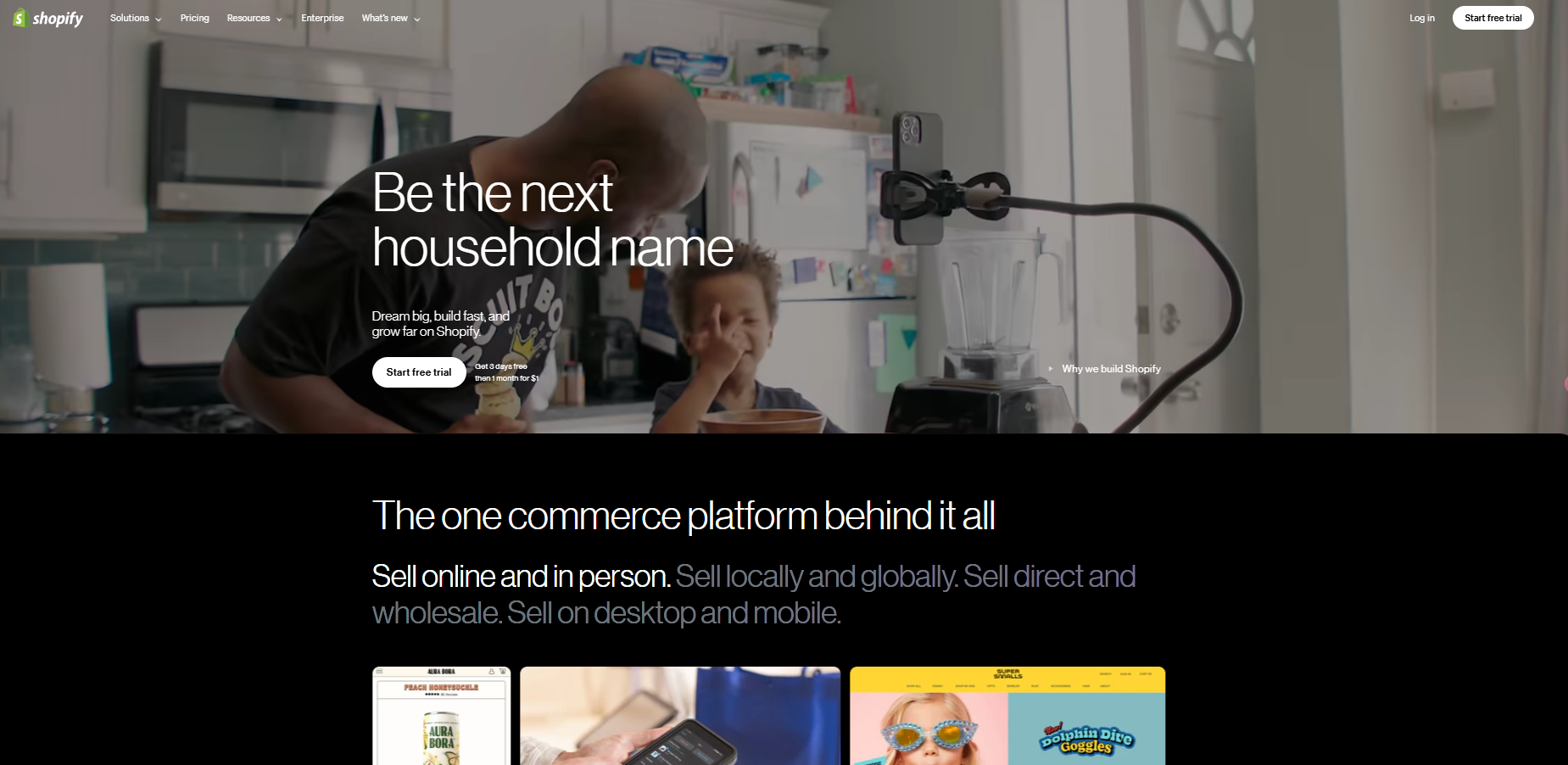
Shopify is a dedicated e-commerce platform that has established itself as a leading solution for online retail since 2006. Unlike Wix’s broader website-building approach, Shopify was specifically designed from the ground up for e-commerce, focusing exclusively on helping businesses sell products and services online.
For merchants, Shopify offers a purpose-built ecosystem that includes everything needed to run a successful online store. The platform provides comprehensive features including advanced inventory management, multichannel selling capabilities, and sophisticated shipping solutions.
The Shopify POS app further enhances the platform by managing in-store sales and syncing inventory. What sets Shopify apart is its specialized e-commerce infrastructure, which handles everything from secure checkout processes to complex shipping calculations and tax computations.
Shopify Lite is a low-cost plan designed for users who want to add e-commerce functionality to their existing websites for just $9 per month.
Pros of Shopify
E-commerce Specialization. Its comprehensive e-commerce toolkit includes advanced inventory management, multi-channel selling capabilities, and sophisticated payment processing options.
Excellent Scalability. Managing everything from high-volume sales and multi-channel operations to international transactions, while maintaining reliable performance even during peak traffic periods.
Extensive App Ecosystem. It provides merchants with countless options to extend their store’s functionality
Payment and Security. Shopify offers a built-in payment system (Shopify Payments) to streamline the payment process and ensure security.
Cons of Shopify
Cost Structure. The cost structure can be a significant consideration for merchants, as expenses can accumulate quickly between monthly subscriptions, transaction fees, and necessary app purchases
Customization Complexity. It requires technical knowledge for advanced customization and a stiff liquid template language learning curve.
Content Management. It provides basic blogging capabilities and limited CMS features not ideal for content-heavy websites.
Platform Dependency. It locks into Shopify’s ecosystem and relies on apps for extended functionality.
Wix vs. Shopify: Pricing
Wix Pricing
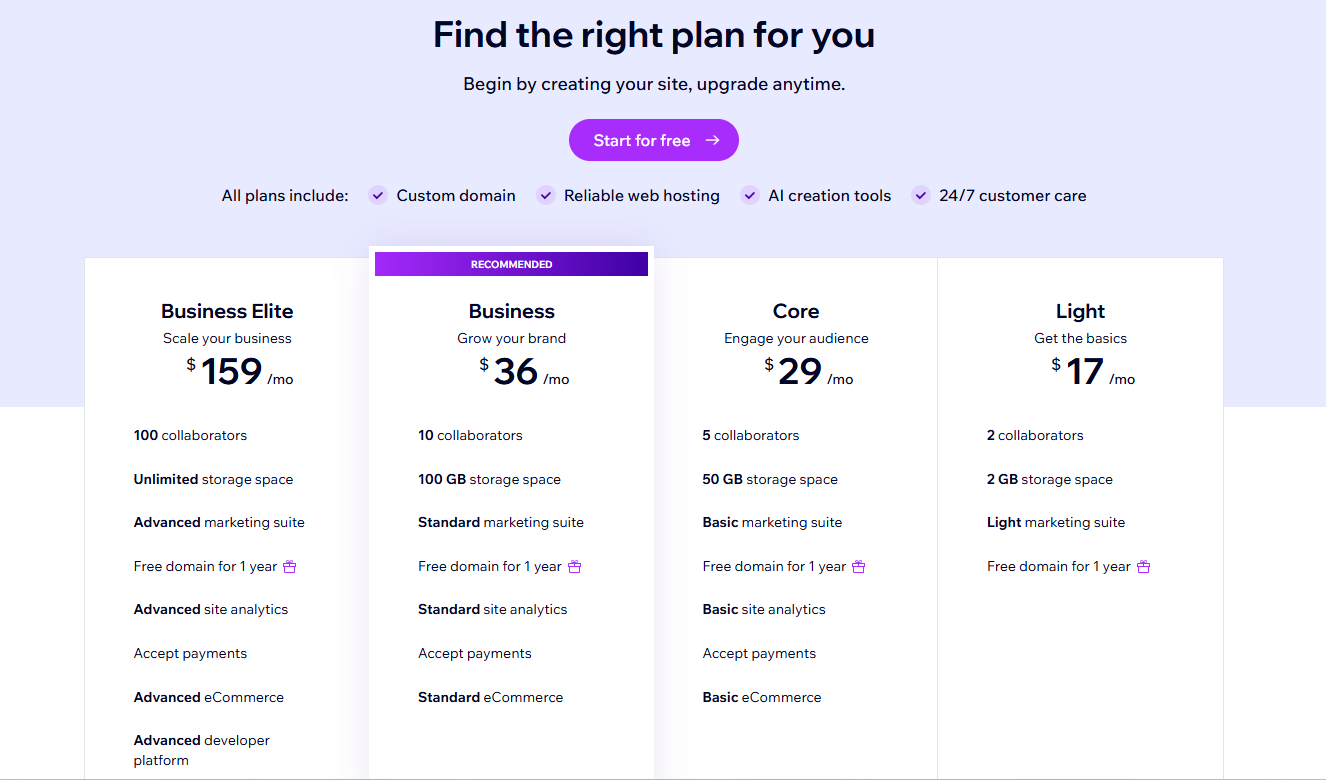
Wix has a range of pricing plans starting at $17/month with the Lite plan. However, this entry-level plan is not e-commerce-enabled. It fits small businesses or individuals who want to have an online presence without immediate e-commerce needs.
The Core plan at $29/month is the best starting point for businesses that want to sell online. It has all the e-commerce tools for setting up an online store and managing sales. As the business grows and becomes more complex, it may become necessary to give backend access to more team members. Wix’s Business plan at $36/month supports up to 10 collaborators which is a cost-effective solution for small teams.
For larger teams or businesses that need premium features, the Business Elite plan is $159/month and supports up to 15 collaborators with priority customer care. Wix also has enterprise plans with custom pricing for businesses that need advanced solutions.
Although Wix is cost-effective and has scalable plans, it’s best for smaller businesses entering the e-commerce space. It prioritizes affordability and basic functionality, so it’s an excellent starting point for entrepreneurs with limited resources. However, as the business grows, some may find its scalability and advanced e-commerce tools to be limited compared to Shopify.
Shopify Pricing and Shopify Payments

When conducting a Shopify comparison with Wix, it’s essential to consider pricing as a significant factor. On the flip side, Shopify is built for e-commerce and accommodates businesses of all sizes. Its plans start at $39/month for the Basic plan, which has all the tools needed to start selling online instantly. The Shopify plan at $105/month has additional features like professional reports and 5 staff accounts.
For businesses managing higher sales volumes, the Advanced plan, at $399/month, offers custom reporting and up to 15 inventory locations which is perfect for brands that operate in multiple regions.
As to high-volume enterprises, Shopify Plus is an ideal premium solution at $2,300/month with a 3-year contract. This plan suits brands that need deep customization, automation, and priority support. Shopify also has a Starter plan at $5/month, which is a feature-light option for businesses that want to sell on social media or through a simple website.
Despite Wix being a budget-friendly platform for small businesses, brands that want to grow fast may find Wix’s scalability limited, especially in handling large inventory, advanced analytics, and multi-location operations.
Across the divide, Shopify is designed to support businesses at every stage of growth. Its advanced features, inventory management, and scalability options make it the best choice for businesses that have set their eyes on expansion. However, the higher pricing may be too steep for small businesses or those just starting.
Read More: [Shopify Payments Review]
Wix vs Shopify: Ease of Use
When creating an online business or expanding its presence, ease of use is a pivotal point to consider. Luckily, both Wix and Shopify are designed to facilitate the web-building process.
On the part of Wix, its most prominent feature is an immediate visual preview. Every change you make when designing your online website is reflected in real-time. Such functionality makes it easier for users to check if a desired progress continues. Wix templates are also various and well-designed.
Shopify employs drag-and-drop functionality, which makes it an ideal platform for beginners. Business owners can quickly create a basic online storefront because the website is mainly built using sections, blocks, and pre-set alignment. Setting up and managing a Shopify store is straightforward due to its user-friendly interface, making it an excellent choice for ecommerce businesses.
Shopify templates can be a convenient tool for beginners. They can employ the ready-made design as a foundation and add more complex functions.
In a nutshell, both Wix and Shopify have user-friendly interfaces, while Shopify provides more flexible and customized options. If your business requires a unique checkout page or a highly individualized online shopping environment, Shopify is more advantageous.
Wix vs Shopify: Site Design
Wix Site Design Features
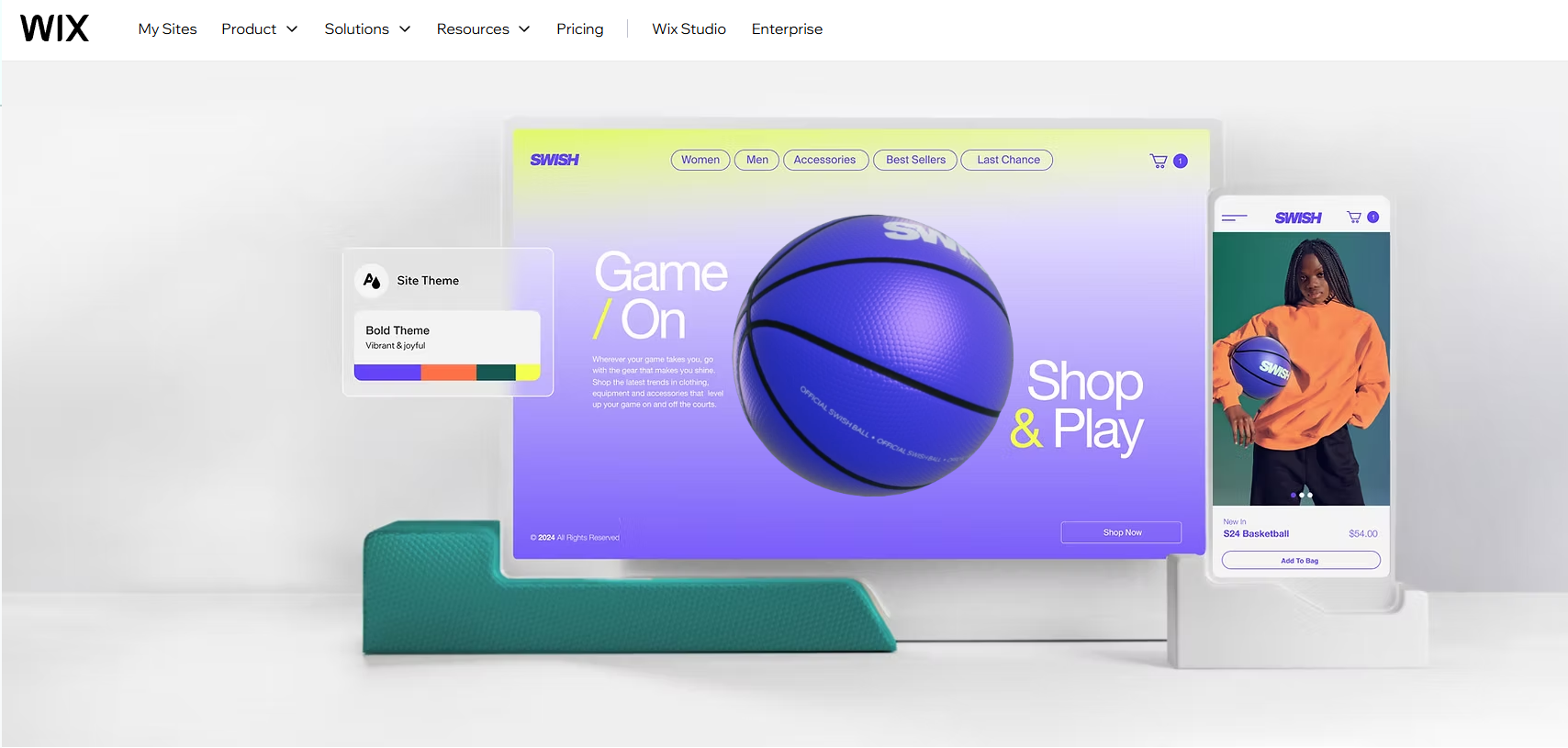
When it comes to site design tools and capabilities, Wix is known for its simplicity. The platform has an intuitive drag-and-drop editor and an AI website builder called Wix Artificial Design Intelligence (ADI). These two, plus a vast library of over 800 templates, empower even beginners to build their websites quickly.
Wix’s mobile editor also enables businesses to optimize their websites for mobile visitors. Thus, they can create mobile-responsive websites that render well on different screen sizes. Code access is also available for users with technical expertise who want more design flexibility.
The Wix App Market offers an extensive collection of third-party applications that enhance website functionality, such as improving eCommerce capabilities, aiding in lead collection, and optimizing website design.
The Wix platform best suits small to medium-sized service-based and creative industries. Its industry-specific tools, such as Wix Video and Wix Events, empower businesses to create stunning visual content and book clients.
For example, a local photography business could use Wix ADI to quickly generate a portfolio website and customize it to its specific needs using the drag-and-drop editor. With Wix’s mobile editor, the business can ensure visitors using smartphones have a wonderful experience on the website. Additionally, it can leverage Wix Video to create captivating visuals and provide a form for customers to book their sessions.
Shopify Site Design Features

On the other hand, Shopify is an e-commerce-first platform ideal for retailers, subscription-based businesses, and brands scaling. Its design process is more structured and focuses on e-commerce efficiency.
The platform has over 100 professional themes optimized with online selling features like product pages and checkout flows. All themes are mobile-optimized, and Shopify also has an easy-to-use drag-and-drop theme editor.
Shopify’s coding language, Liquid, also gives code experts more design flexibility. The platform features product galleries that seamlessly integrate with a business’s inventory. The Shopify app store is also a hub for over 8,000 paid and free apps that enhance store functionality, such as multi-carrier shipping and tracking, custom checkout flows, and more.
Read More: [Top 10 Free Shopify Themes to Promote Your Business]
Wix vs Shopify: Marketing
Marketing tools are essential for online business success.
Wix provides a solid foundation for basic marketing needs. Its email marketing system helps you run campaigns and collect customer feedback. The platform integrates with social media channels for sharing updates and promotions. You can track campaign performance through built-in analytics and build customer loyalty through various engagement tools.
Shopify takes marketing capabilities further with its e-commerce focus. Its marketing suite is specifically designed for driving sales, with advanced features for product promotions and conversion optimization. The platform excels at tracking customer purchase behavior and automating targeted marketing campaigns. With 24/7 support available, even beginners can effectively implement their marketing strategies.
While Wix offers adequate marketing tools for general business needs, Shopify’s specialized e-commerce marketing features make it the stronger choice for online stores focused on growing sales.
Wix vs Shopify: SEO Features
Search engine optimization is crucial for e-commerce success, as most shoppers begin their buying journey through search engines.
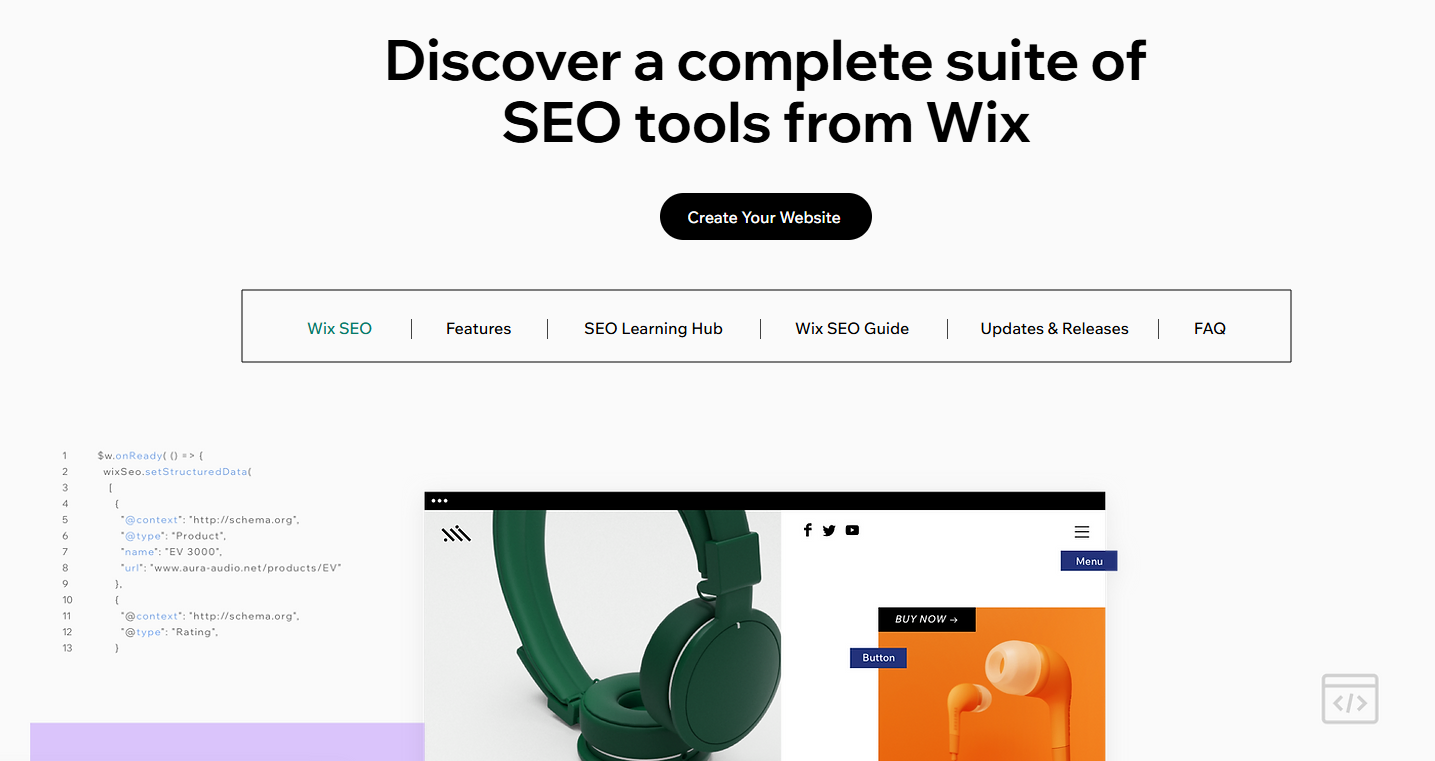
Wix’s standout SEO feature is its SEO Wiz tool. After answering a few questions about your business, the tool creates a personalized optimization plan. SEO Wiz guides you through improving your site’s search visibility with recommendations for mobile optimization, site structure, meta tags, and image optimization.
Shopify approaches SEO with more technical flexibility. The platform lets merchants fully customize meta tags and URL structures across all pages, from product listings to blog posts. It automatically generates XML sitemaps and canonical tags, streamlining technical SEO work. These features particularly benefit e-commerce sites with large product catalogs.
While both platforms help improve search rankings, Shopify’s e-commerce-focused SEO tools give it an advantage for online stores. Wix’s guided approach suits beginners, while Shopify offers more advanced control for serious e-commerce businesses.
Wix vs Shopify: Integrations and Wix App Market
Third-party applications can significantly enhance your online store’s functionality. Wix’s App Market offers around 300 apps focused on adding website features and basic business tools. These apps mainly serve to enhance site design, add new functionalities, and support basic business operations.
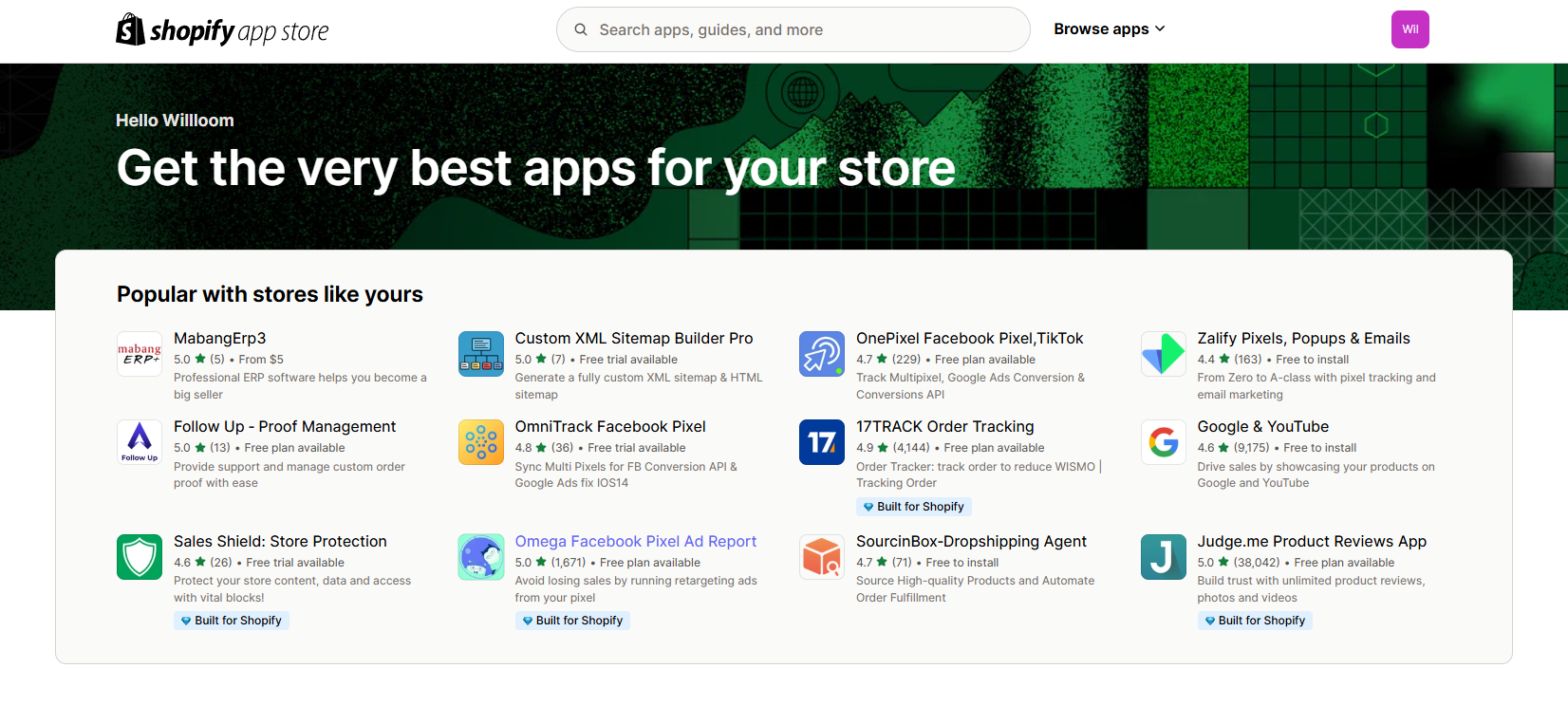
Shopify’s App Store is considerably more extensive, with over 8,000 apps and integrations. Beyond basic website features, Shopify’s integrations cover everything from advanced email marketing to accounting systems, inventory management, and international shipping. This rich ecosystem makes Shopify particularly powerful for growing e-commerce businesses that need specialized tools and service integrations.
While Wix provides sufficient integrations for basic business needs, Shopify’s extensive app marketplace offers more comprehensive solutions for serious e-commerce operations.
Wix vs Shopify: AI tools
Both Wix and Shopify leverage AI technology to enhance their platforms, but they focus on different aspects of online business.
Wix pioneered AI in website design with its Artificial Design Intelligence (Wix ADI). After answering a few questions about your business, ADI creates a complete website with appropriate layouts and design elements. Wix’s AI extends beyond design, offering tools for generating product descriptions, blog posts, and promotional content. For those needing technical help, an AI code assistant helps implement custom features without coding knowledge.
Shopify’s AI tools focus squarely on e-commerce operations. Shopify Magic streamlines product listing creation and optimization, particularly valuable for stores with large inventories. Its AI assistant, Sidekick, provides personalized store management guidance, suggesting price adjustments and tracking sales trends. The platform also offers AI-powered customer support tools and automated image editing features for product photos.
The distinction is clear: Wix’s AI excels at design and content creation, while Shopify’s AI tools concentrate on optimizing e-commerce operations and sales performance.
Wix vs Shopify: Dropshipping
Both Shopify and Wix support dropshipping businesses, but they differ significantly in their capabilities and approaches.
Shopify excels in dropshipping with its extensive features. It integrates seamlessly with DSers, AliExpress, and other major suppliers. Through apps like DSers, Dropshipman, and CJDropshipping, merchants can easily connect with global suppliers. Shopify’s powerful automation handles everything from inventory pricing to order tracking and supplier coordination.
In contrast, Wix offers more basic dropshipping functionality. It provides essential features through partnerships like Modalyst, including product importing, inventory synchronization, and order management. While more limited, these features adequately serve small-scale dropshipping operations.
From a practical standpoint, beginners might prefer Wix for its lower cost and simpler setup. However, for those planning to scale their dropshipping business, Shopify’s advanced features and scalability make it the better choice. Specifically, Shopify’s Advanced plans provide the necessary automation tools for large-scale operations.
Wix vs. Shopify: Customer Support
Reliable customer support is crucial when running an online store, as technical issues can directly impact your business.
Wix provides support through its comprehensive help center, featuring detailed tutorials, troubleshooting guides, and community forums. For direct assistance, they offer a callback service – you leave a message describing your issue, and their support team calls you back to resolve it.
Shopify takes a more hands-on approach with round-the-clock support through multiple channels. Users can get immediate help via live chat, email, or phone. The platform also maintains active social media channels for additional support options. This extensive support system particularly benefits e-commerce merchants who can’t afford downtime in their online operations.
The difference is straightforward: Wix emphasizes self-service resources with callback options, while Shopify offers more immediate, direct support across multiple channels. Your choice might depend on whether you prefer comprehensive documentation or instant access to support staff.
Wix vs Shopify: Security and Performance
Both platforms prioritize store security and performance, but they serve different business needs.
Shopify delivers enterprise-grade security with PCI DSS Level 1 compliance and SSL certificates – matching bank-level protection. Its 24/7 security monitoring, fraud detection, and automatic backups protect your business around the clock. Performance-wise, Shopify’s global CDN ensures 99.98% uptime and fast loading speeds worldwide, handling high traffic with ease.
Wix provides reliable security for smaller stores, including SSL certificates, DDoS protection, and secure payment processing. Its global CDN and automatic mobile optimization keep your store running smoothly. While not as extensive as Shopify’s features, Wix offers everything a small business needs to operate securely.
The choice is straightforward: Wix works well for small stores and beginners, while Shopify is better suited for larger operations or businesses planning significant growth. Both will keep your store secure – pick based on your business scale and plans.
Wix vs Shopify: Which is Better for Your Business?
After a detailed analysis of the differences between Wix and Shopify, it’s time to decide which to choose for your business.
While Wix is excellent in many aspects, such as pricing, marketing tools, and SEO tools, it falls slightly behind Shopify in the final competition. Suffice it to say that it is more suitable for start-up small businesses with low budgets and fewer requirements. Additionally, the Wix store allows users to sell through various platforms, though it offers fewer integration possibilities compared to Shopify, and covers tax calculations effectively.
Shopify owes its victory to its user-friendly interface and guidance, powerful built-in features, a fantastic number of third-party applications, and robust e-commerce tools.
As for the pricing concern, it offers a three-day free trial suitable for those hesitating between Wix and Shopify. With such a chance, you can experience the full features and functionalities of this e-commerce expert and make your final decision.
What’s Next?
The choice between Wix and Shopify should be based on a careful review of your business, including its scale, plans, growth, and so on. If you eventually prefer using Shopify as your e-commerce platform but are afraid of the complexity of setting up and operating an online store, here are some suggestions.
For one thing, you can take full advantage of Shopify’s built-in features, such as storefront design, basic SEO, and customer support.
There are many Shopify experts at your disposal. For example, Channelwill offers an all-in-one solution to your online business, ranging from AI-generated SEO and marketing to logistics and customer loyalty.
Wix vs Shopify FAQ
Wix is generally more affordable than Shopify, with the least expensive plan costing only $16 per month, while Shopify’s Basic Plan is $39 if paid monthly. However, Shopify offers a free trial of three days and the first month for only $1. It is a perfect opportunity for you to try the features and functionalities of this powerful e-commerce platform.
Yes, you can start your dropshipping business on Wix. Wix allows you to integrate a dropshipping platform with your store, import products, manage orders, and design customer service. You can leverage the platform’s features in inventory management, order fulfillment, and logistics planning.
The cost of building your website with Wix depends on your specific needs and the website’s complexity. You can design a basic website for free using Wix’s essential features, such as website-building tools and templates. Wix also offers advanced plans if you want to design more complicated websites. The cost ranges from $16 to $159 per month.
The answer is affirmative. Shopify is designed to be an outstandingly user-friendly and beginner-friendly platform with an intuitive interface. It has numerous step-by-step tutorials and guidance articles to help beginners adapt to the world of e-commerce. If you encounter any problems, you can contact Shopify’s help center via phone, email, or live chat.
Note: This blog was originally written in English and translated using an automated tool to make the content accessible to a global audience. We believe in sharing valuable insights with everyone and apologize for any inaccuracies. If you spot any errors, please feel free to contact us for corrections. Your feedback helps us improve and ensures the content’s value is fully realized.









